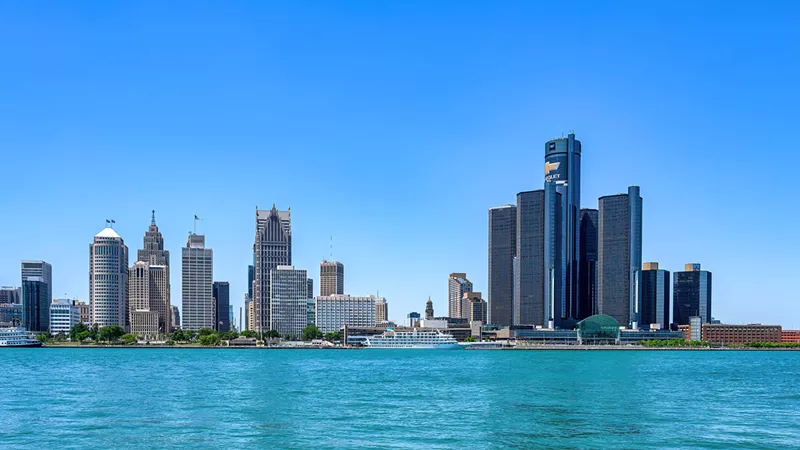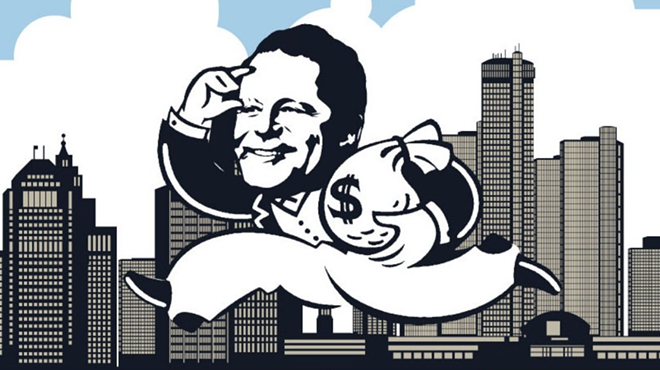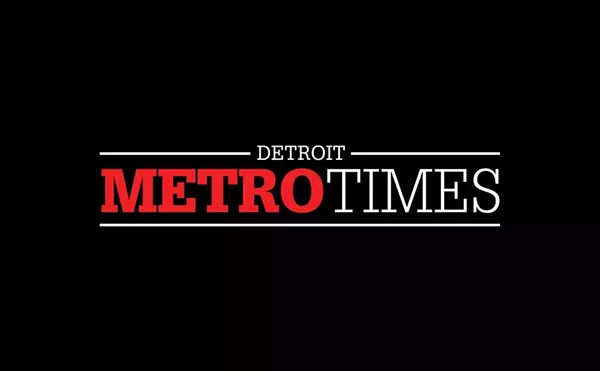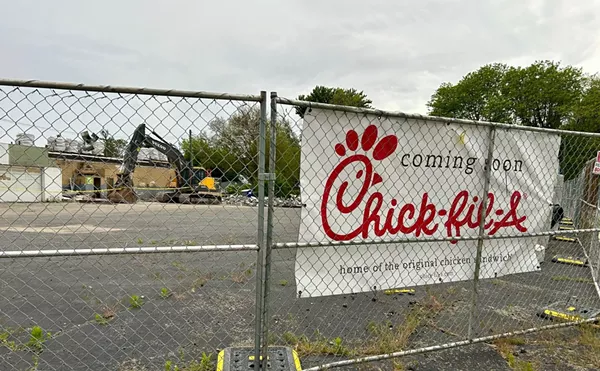MOM! The billionaires need more money! Again!
General Motors and Dan Gilbert want up to $350 million from the public, or they’ll bulldoze the whole goddamn Ren Cen

Audio By Carbonatix
[
{
"name": "GPT - Leaderboard - Inline - Content",
"component": "35519556",
"insertPoint": "5th",
"startingPoint": "3",
"requiredCountToDisplay": "3",
"maxInsertions": 100,
"adList": [
{
"adPreset": "LeaderboardInline"
}
]
}
]

It’s hard not to be cynical about this shit.
Yet again, obscenely wealthy corporations and billionaires are banging their little tin cups on the pavement, seeking handouts. And if they don’t get them, well, the public might just get fucked.
This time, it’s General Motors and real estate/mortgage tycoon Dan Gilbert partnering to ask for up to $350 million from the public for a $1.6 billion plan to raze and redevelop part of the Renaissance Center after the automaker relocates up Woodward Avenue to Gilbert’s new Detroit Hudson’s skyscraper.
And if they don’t get it, they just might take the wrecking ball to the whole fucking thing, ruining the heart of Detroit’s beloved skyline. That’s morally repugnant petulance on a grandiose scale.
Traditionally, the most egregious examples of such wanton behavior have come from professional sports team owners who want the public to finance some or all of the construction of lavish new ballparks and arenas — dazzling cathedrals that can justify pricier tickets and trinkets — and if they don’t get taxpayer help then they might threaten to relocate their team to a city elsewhere that will give them whatever they want. And that has happened. Ask Cleveland Browns fans. And Oakland Raiders and Athletics fans. And St. Louis Rams fans. Etc., etc., etc.
The team owners make noise about the franchises being “community assets,” which, of course, is horseshit. They’re all as wealthy as cartoon sultans and keep the fresh profits generated by the new venues that are packed with luxury suites and palatial members-only clubs that are priced far beyond the reach of typical fans. And their new palaces are often rigged to be off the property-tax rolls or they’re granted long-term exemptions that starve the local community of badly needed funding.
In return, the community is typically promised new jobs and payroll taxes. The jobs are temporary construction gigs, and the permanent roles are mostly janitorial, maintenance, and event-related, such as tickets and concessions, which are of genuine value to people that need them but certainly not at the enormous public expense demanded by the oligarchs.
Then the oligarchs fail to meet their promises. Oopsie! Maybe next time. Or the time after that. Just keep the subsidies flowing.
Outside of our beloved gladiatorial bloodsports, we see the traditional business community use the same lofty civic pride rhetoric, job promises, and vague or overt threats, too. Gilbert’s Bedrock real-estate arm that built the Hudson’s Detroit building isn’t even expected to meet its subsidies-for-jobs promise — GM is merely moving up the street to it — and the Ren Cen plan is to raze two towers while making the others renovated office space and luxury residences. Jesus H. Christ, people.
All they want is $250 million from the state, and maybe $100 million from the city.
It's not like these entities are paupers. GM, which to its credit is promising to donate any of its future profits from the Ren Cen project to education nonprofits (for a succulent tax write-off, no doubt), finished last year with net income of $10.1 billion on $171.8 billion in revenue. That’s a shitload of Silverados and Sierras, and triple the annual GDP of the country of Belize.
Dan Gilbert, meanwhile, is estimated by Forbes to be worth almost $24 billion, meaning he and his business empire have easy access to astronomical sums of cheap cash. He’s the 85th richest of Earth’s 8.2 billion humans.
In 1996, GM paid $73 million for the Brutalist-style Renaissance Center that originally cost $350 million to build between 1973 and 1981. The automaker spent another $500 million to significantly renovate and expand it. Now it’s keen to shed an albatross of a building constructed as a literal fortress for the Lords of Industry to safely print cash in post-1967 rebellion Detroit.
All that steel and concrete couldn’t protect the executive class from a pandemic’s ripple effects – remote work that turned Class-A corporate monuments to unrestrained, unrepentant capitalism into mausoleums.
State lawmakers today are making skeptical noises about handing over yet another check to these extremely wealthy entities, so there’s a charm offensive underway.
Here’s what David Massaron, GM’s vice president of infrastructure and corporate citizenship, told Crain’s Detroit Business last week: “At the end of the day, the pursuit of this option isn't about GM making money. It’s about GM finding a way to responsibly and effectively situate the RenCen complex and the land for the future.”
Massaron also said this to Crain’s: “I don't think it should be seen as do this (approve public subsidies) or the building comes down.”
Then why even mention it? Don’t bullshit us. The looming threat is part of the deal. The public and its elected leaders must be punished if they don’t obey the nobility.
In the same interview, longtime Detroit real-estate consigliere Matt Cullen also portrays the Ren Cen project as an example of Gilbert’s beneficence, saying they’re not going to make heaps of profit off of it and that it’s more of an “altruistic” endeavor.
“Will there be some money coming out of it? I mean, maybe. I hope so. But it won’t be anything commensurate with the scale of the investment, the risk of the investment and the time that’s going to take them to get any return at all,” he told Crain’s.
So Dan Gilbert is just a chill guy doing cool stuff because he loves Detroit so much. He’s proven his affinity for the city and certainly made risky investment gambles in Detroit when it was in shambles, but he’s no fool. He’s seeking more handouts because he keeps getting them. Nothing suggests that after a little performative political sturm und drang, he won’t get more. It’s how the game is played in our corrupt society.
If they don’t get to win the game, they’re going to demolish the heart of the city’s skyline. As a last resort, they assure us. But holy shit, what a dismal game this is for the rest of us.
The wealthy typically donate and vote Republican, loudly extol free-market economics, and lambast entitlement spending as EVIL WOKE COMMIE SOCIALISM while shamelessly demanding space to feed at the public trough despite zero need. These Hayek-Friedman acolytes of the sacred and righteous free market are adamant about taxpayers socializing the risks of their extravagant schemes in that very same free market. Feeling bad about such greasy hypocrisy is for suckers, apparently.
Oh, and remember when GM got a $50 billion bailout that soaked taxpayers? I do.
We have an incoming Trump administration that both General Motors and Gilbert have cozied up to over the years, even as Trump has promised his own repugnant brand of vengeance fascism, curtailing civil rights, and destroying vital safety nets like veterans care, Social Security, and Medicare. This serial-bankrupt oaf is mindlessly business-friendly (and lazy, so he’s outsourcing the dirty work to vicious dickheads like Elon Musk), which has corporate America and many of its courtier media toadies already preemptively genuflecting and kissing Trump’s gold-plated, cubic zirconia ass.
What all this suggests is an America that’s a sleazy hothouse for the ruling class to more easily divert tax money to itself and away from helping the poor, sick, elderly, veterans, etc. It’s like we looked at Weimar Germany and decided that’s a great template to emulate, but in much dumber ways. Like embracing ruinous tariffs and rejecting life-saving vaccines.
Unlike the gloriously decadent and ill-fated Weimar Republic, today we have history to (allegedly) learn from, and experts to warn us about bad policy.
Those whose job it is to suss out the genuine economic benefits and costs of corporate subsidies have said for decades that their research — the independent kind, not the sort paid for by moguls and industrialists seeking handouts — proves that using taxpayer dollars for these sprawling private projects is poor public policy. Sports and business both use similar tactics to get their handouts because they work. The experts, naturally, get ignored.
“I’m not sure which came first, sports or business, but they are definitely using the same playbook,” says J.C. Bradbury, who has researched and written about subsidies as a professor of economics at Kennesaw State University.
“I believe sports have an advantage at getting subsidies, because they are generally viewed more positively than businesses, but businesses get more of the perks by far because there are so many more incentives handed out to industry.
“There is some sort of confusion about businesses needing a leg up from government, but that's not really the case,” Bradbury adds. “The expected ROI on these deals is negative, but executives have learned that if they ask, they will normally receive. It helps that the people approving the deal are normally part of the economic development industrial complex that believes incentives are an important tool for promoting local growth, even though that is not the case.”
Detroit has long been a poster child for the subsidy game. It has used a complex system of overlapping downtown tax-capture districts since the 1980s to help finance private projects such as the Millender Center, Riverfront Towers, One Detroit Center, and 150 West Jefferson. More recently, Little Caesars Arena and the Ilitch family’s grandly promised/glacially delivered District Detroit mixed-use project has benefited from enormous sums of public financing from the city, county, and state. And the state’s Transformational Brownfield incentives are a gargantuan tax giveaway to the wealthy, even if they’re slow to deliver the promised buildings. More such handouts are coming.
The public has largely come to accept that the rich and powerful get whatever the fuck they want. Look at Ford’s Michigan Central Station renovation in Corktown. It’s great that the automaker brought that unfortunate eyesore back to life, after the infamous Moroun family left it to decay for decades.
But did Ford really need an incentive? The state gave Ford a 30-year tax abatement in 2018 to offset its renovation of the derelict train station, saving it almost $7 million a year in taxes.
It’s wonderful that the train station is revitalized, and hopefully it fuels more progress around it. There’s real value in feel-good civic pride stories and shedding ugly symbols of the past. But it’s also easy to wonder what an oxidized Rust Belt city could do with $207 million over three decades in places other than the central business district and high-profile corporate projects, no? But we’ll never know because the car company that took in $4.3 billion in profit last year on $176 billion in revenue is getting a discount on its taxes.
For those curious about the math, $6.9 million is 0.003 percent of $176 billion.
One can reasonably argue that the role of government is to grease the rails for the private sector to create a thriving economy, and there’s truth to that. We all need streets, water and sewer service and utilities, cops and firetrucks and ambulances, schools producing an educated workforce, trash service, libraries, and public recreation spaces. Taxes are the price of civilization. And it’s nice to have a safe, thriving downtown. Not every business in the city is a billionaire’s enterprise. The little businesses can benefit from basic government infrastructure spending, too, even if the system is gamed for the wealthiest.
Are all those aforementioned public services in good working order in Detroit while the business community gets welfare checks and tax discounts? Services are better than they were, certainly, and private investment has helped, but good lord they were monstrously shitty for all the reasons we well know, and they still need help. So should we have been handing over or forgoing so much tax money to the unelected, unaccountable private sector?
Were they not going to do anything in the city without taxpayer subsidies? Must they be bribed? That doesn’t seem like genuine altruism. These are the opportunity cost questions that will never be answered.
It’s thorny because of Detroit’s unique post-industrial and racial history. Businesses absolutely have invested huge sums of their own in the city for profit-minded and altruistic reasons, but it sets my teeth on edge when they expect endless subsidies in return, and my skin crawls at the notion of the ruling class continually coming back to demand more and then hint ugly threats if they don’t get what they desire.
I told you it’s easy to get cynical about this shit.
Sign up for Bill Shea’s free, dolphin-safe, hand-crafted, artisanal, American-made, gluten-free, free-range, small-batch, unexpurgated, openly biased, middle-aged radical pinko Beatnik essay site at billshea.com.






